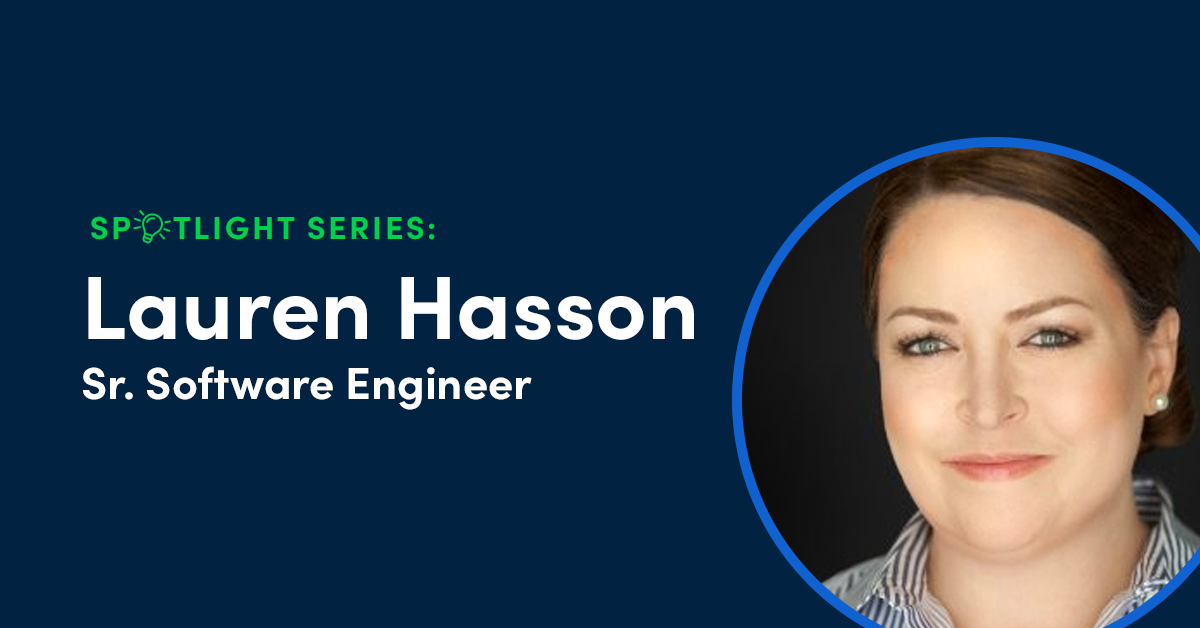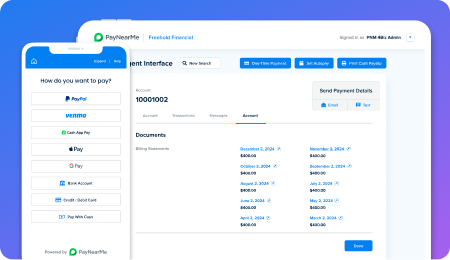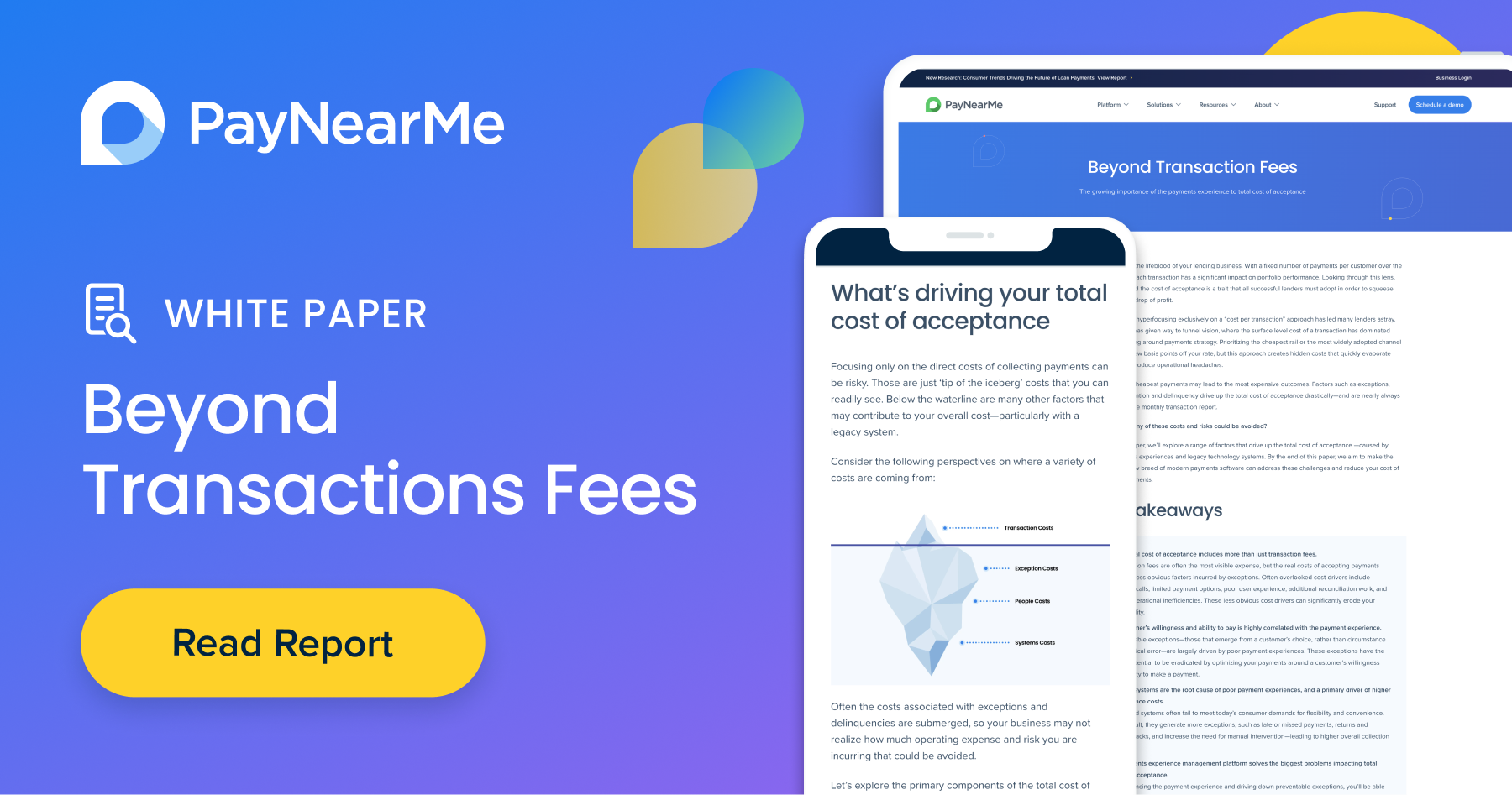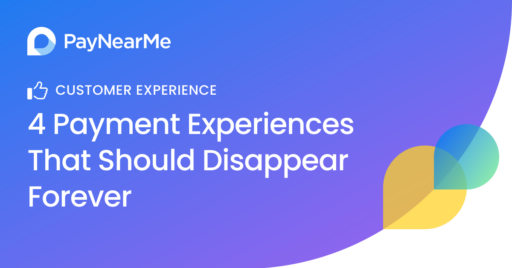Spotlight Series: An Interview with Lauren Hasson, Senior Software Engineer

In this new series, we’re going behind the scenes at PayNearMe to learn about the people that make our platform shine. In today’s interview, we sit down with Lauren Hasson, Senior Software Engineer, to chat about her role in the company, key projects and her outlook for the future of payments.
Q: Tell us about your role at PayNearMe:
LH: I proudly wear multiple hats at PayNearMe. I’m the architect of our IVR (Interactive Voice Response) as well as owning all of our messaging capabilities, including SMS, email and push notifications. Recently I’ve been working extensively on our reporting tools—they’re not as interesting to talk about to the average person, but our customer and product teams are loving the new reporting flexibility we’re building into the platform.
If that’s not enough, I’ve played a significant role in our application security function. Nearly every line of code that we’ve deployed over the past couple years has likely gone through my hands.
Q: Wow! You’re involved in quite a few things today. How did you end up getting involved in these different functions?
LH: Prior to PayNearMe, I was working on a lot of high-profile, award-winning iPhone and iPad apps. My projects had been picking up a lot of accolades at the time, one was even featured in the iOS 7 Keynote.
PayNearMe brought me in to own our new iOS SDK when we were developing consumer-facing bill-pay applications a few years ago. When we pivoted to mobile-first web apps, they knew my experience would translate well to our security team. I developed a real interest in application security, and eventually became owner of the AppSec department.
I also gained expertise in Ruby on Rails, allowing me to make a transition into our app development team.
Q: How do you balance all of this?
LH: I typically split my job into days of the week based on current priorities. For example, Mondays are typically for security reviews, Tuesdays are “release days”, and then the rest of the week tends to be focused on product engineering and development.
We’re an incredibly agile team which makes planning and partitioning decisions much simpler. When everyone is playing by the same rules, using the same systems (i.e. Jira) and collaborating the same way, you can be much more comfortable ordering tasks and knowing what to work on any given day.
Q: You mentioned that you were the head architect for our IVR function.
LH: Yes – I was getting there! When we made the shift from cash-only to a full electronic payments (EP) platform, it was obvious we needed to develop some baseline EP technology for our customers. I built a full-blown IVR system in about three months, and then started iterating on top of that.
Q: Rewind for a moment…you built the initial IVR system in three months?!
LH: Ha, yes. Obviously the Product team diagrammed a lot of the functionality they wanted and how it would interact. I then translated that into an architected system. The biggest challenge was getting started with something brand new.
I typically take an iterative approach. Meaning, you experiment with a small interaction and see how the system responds, and keep iterating back and forth until you have a fully working application. You then add on to this with new interactions and new features, all fully compatible and separate from the original iterations. This process yields really flexible products.
For example, we have a completely dynamic voice prompt system. This means that we can make updates to voice prompts for each merchant (within certain parameters) without having to deploy any new code. This allows for a lot more customization for our customers while still keeping our codebase consistent and easy to update globally.
Q: Do you always build this way? Do all our other engineers?
LH: Our team has a lot of deep knowledge in different areas, which is really important for building dynamic apps. I often consult with different specialists and ask if there are any ways to make a new function more scalable, more flexible for the future.
Q: Tell me about your work on messaging.
LH: I inherited the messaging codebase a while back, and essentially I’ve either worked through, replaced or updated every line of code in our messaging framework. I’m now the owner of the codebase and can tell you pretty much anything you need to know about it. If there’s a messaging question, it comes to me first.
Most recently we have done a lot of work on SMS reporting capabilities. So if you want to understand more about which text messages convert to paying customers, or see your opt out rates, or see any number of engagement stats, we can now do this across our customer base.
This was a really big undertaking because SMS messaging is prevalent throughout our codebase. Think of it like a spider web that has all these different connection points across the entire platform.
The number one challenge was: don’t break anything that already works! With millions of messages being sent, this is critical. It was definitely one of the most complex projects I’ve worked on in my tech career.
Q: Go on…tell me how you did it!
LH: Well as I mentioned earlier, there’s a lot of deep, shared expertise in our team. We’ve had engineers that have been here for over a decade so we have a lot of deep knowledge surrounding our platform. And even with a really complex codebase – it can take senior engineers over a year to fully understand it – this shared familiarity becomes invaluable when understanding how different interactions will affect different pieces of the product.
That’s one of the reasons I joined PayNearMe. There’s a real emphasis on quality and doing things right and maintaining reliability. Steady engineering leadership with a deep bench of expertise means we’re able to ship quality code at a remarkably fast rate. It’s a lot of fun to be a part of.
Q: Shifting gears for a moment. Our team doesn’t bring in a lot of outside tech. There seems to be a big emphasis on build vs. buy – which isn’t the norm around the industry. Why is that?
LH: Our customers have very specific needs, and it’s easier for us to customize things to work exactly the way we want when we build them. It all goes back to that steady leadership and deep bench I talked about. Because we have long-tenured employees, we have long-tenured expertise—a real competitive advantage in my opinion.
In some cases, we’re able to ship things in months that other companies have had on their wish lists for years.
Q: Let’s have some fun. Do you have any predictions for the future of payment tech.
LH: Oh, yes! I personally believe that mobile-first and contactless payments are going to continue growing, especially given the rate of adoption during COVID-19.
I’m also a big believer in voice applications for payments. Things like Alexa, Google Assistant, Siri, chatbots, AI – I really think they’re going to be at the forefront of tech and intuitive user interactions. Voice interactions are a front of the line skill that engineers should be focusing on moving forward.
Q: Outside of PayNearMe, what are some of your passions?
LH: I’m the founder of DevelopHer, an award-winning program to raise women in the workplace. It’s gotten bigger than I ever thought it would be, and it’s amazing to see how other women have responded to this program.
I’ve done a lot of work on equal pay, negotiating skills, getting promotions and more. We’ve won a lot of awards for helping women close the pay gap and build their own platforms for visibility. We need more women in tech to amplify their voices.
I also love working out at OrangeTheory. I’m a former athlete and absolutely love their system. I’m a big fan of networking and travel through DevelopHer as well!
Q: Thank you Lauren! It was a treat to kick off our interview series with you.
LH: You’re welcome, thank you for talking with me!




